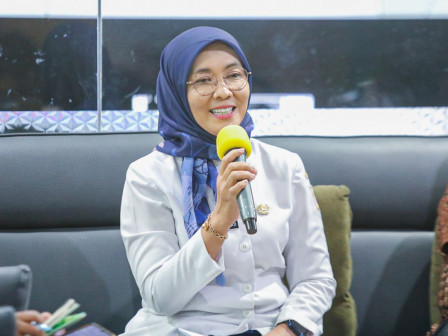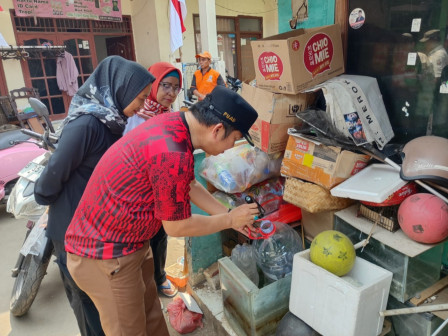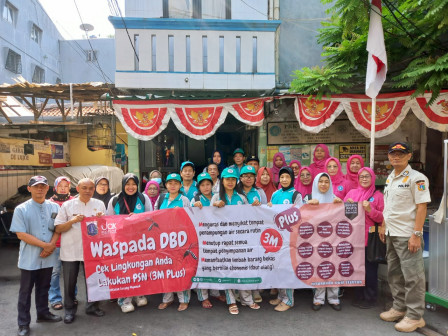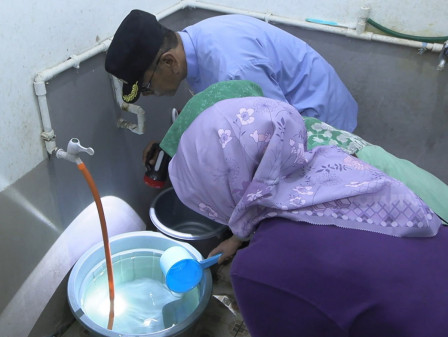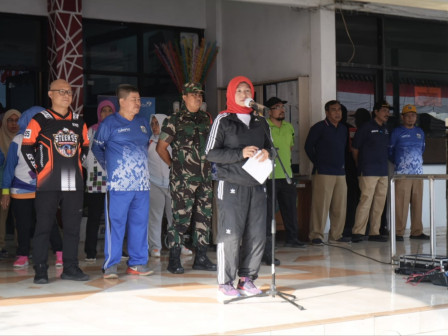City - Health Ministry Launches Wolbachia-Infected Aedes Aegypti Mosquito Release Program
Reported by Folmer | Translated by Nugroho Adibrata
The Jakarta Provincial Government and Health Ministry (Kemenkes) are about to launch a program to release Wolbachia-carrying Aedes aegypti mosquitoes in West Jakarta.
We'll intensify socialization to the public on the Wolbachia method and its applications
The launch will be held on Friday, October 4, 2024, at RW 07, Kembangan Utara Urban Village, Kembangan Sub-district, West Jakarta, as an innovative step in efforts to control dengue fever in Jakarta.
In the context of the launch, the Jakarta Health Agency (Dinkes) by inviting the Health Ministry and Wolbachia researchers from Gadjah Mada University (UGM) held a media briefing activity on the 'Aedes Aegypti Mosquito Wolbachia Implementation Program in Jakarta' on Wednesday (9/26).
North Seribu Islands Intensifies Malaria Risk SurveillanceJakarta Dinkes Head, Ani Ruspitawati explained one of the newest and environmentally friendly strategies as a complement to the main mosquito nest eradication (PSN) program 3M Plus to reduce the transmission of dengue fever is to use natural Wolbachia bacteria. This bacteria inhibits Dengue virus infection, reducing the risk of disease transmission in the community.
"We'll intensify socialization to the public on the Wolbachia method and its applications. We want them to support this program by actively participating as Foster Parents (OTA) who will be entrusted with buckets containing Wolbachia mosquito eggs. Of course, there is guidance from us so that the community understands how to breed larvae and monitor their success," she expressed, as quoted by Jakarta Provincial Government's press release.
She added monitoring and evaluation would be conducted every six weeks to monitor the program's success. In 2025, the target is that the Wolbachia-infected Aedes aegypti mosquito release program can be implemented in all sub-districts in West Jakarta and achieve the success indicator, namely Wolbachia-infected Aedes aegypti mosquito population of more than 60 percent.
Prevention and Control of Infectious Diseases Acting Director, Anas Ma'ruf explained the Health Ministry is implementing Wolbachia technology innovation to reduce cases of dengue fever in Indonesia. Wolbachia technology is an innovation and part of the control strategy outlined in the National Strategy for Dengue Control.
"West Jakarta is one of the priority areas to implement this technology considering the high case of dengue. It has never been done before and will only start to be done shortly," he explained.
As the initial stage, the application of this technology was also carried out in four other cities, namely Semarang, Bontang, Bandung, and Kupang, based on the Health Ministry's Decree No. 1341 on the Implementation of Wolbachia as an Innovation for Handling Dengue. He asserted, this Wolbachia technological innovation does not necessarily eliminate existing dengue prevention and control methods in Indonesia.
"We urge the community to keep carrying out the 3M Plus movement, such as Menguras (Draining), Menutup (Covering), and Mendaur Ulang (Recycling) items or containers that can become mosquito nests, as well as maintaining personal and environmental cleanliness," he added.
On the other hand, one of the Wolbachia researchers, Center for Tropical Medicine, Faculty of Medicine, Public Health and Nursing Director, Public Health and Nursing, Gadjah Mada University (UGM), Riris Andono Ahmad explained that Wolbachia bacteria are bacteria that are commonly found around 60% of insects in the world, such as fruit flies, butterflies, bees, dragonflies, and others. The Aedes aegypti mosquito naturally does not have Wolbachia bacteria in its body. This technological innovation was conducted by inserting Wolbachia bacteria into the mosquito's body through thousands of micro-injection experiments on Aedes aegypti mosquito eggs until it was finally successful and Aedes aegypti mosquitoes were obtained that contained Wolbachia bacteria in their bodies.
"Further reproduction is conducted through the inheritance of Wolbachia from the female Aedes aegypti mosquito to its offspring. Thus, it can be explained that the Wolbachia mosquito is the Aedes aegypti mosquito whose body already contains Wolbachia bacteria that have been bred from generation to generation. There is no genetic engineering in this technology, because physically there is no change in the shape or nature of the Aedes aegypti mosquito with Wolbachia and the Aedes aegypti mosquito without Wolbachia," he explained.
Besides Indonesia, he added, the use of Wolbachia technology has also been implemented in other countries, such as Brazil, Australia, Vietnam, Fiji, Vanuatu, Mexico, Kiribati, New Caledonia, and Sri Lanka. The results have proven effective in preventing dengue.
"The release program of Aedes aegypti mosquitoes with Wolbachia has been tested in several regions of Indonesia and the world with positive results in reducing the number of dengue cases. In one study in Yogyakarta, it was found that the technology of Aedes aegypti mosquitoes with Wolbachia was able to reduce the morbidity rate due to dengue fever by 77% and reduce the number of hospitalizations due to dengue fever by 86%," he explained.
Wolbachia technology for controlling dengue has been recommended by the World Health Organization (WHO) in 2021. After strong evidence was produced, accompanied by risk analysis in Indonesia and WHO recommendations, the implementation phase was carried out in stages, including in Jakarta.
Dengue fever remains a serious health threat in Jakarta and other regions in Indonesia, especially during the rainy season. As of September 2024, there were 12,107 cases of dengue fever recorded in Jakarta.
The plan is that the launching of the Wolbachia-bearing Aedes aegypti mosquito technology will be opened by Jakarta Governor, Heru Budi Hartono and attended by various regional stakeholders, representatives of Health Ministry, health organizations, media, and the public. In the event, the mechanism for releasing Wolbachia-bearing Aedes aegypti mosquitoes, the advantages of this technology in controlling dengue fever, and plans to expand the program to other areas in West Jakarta will be explained.
